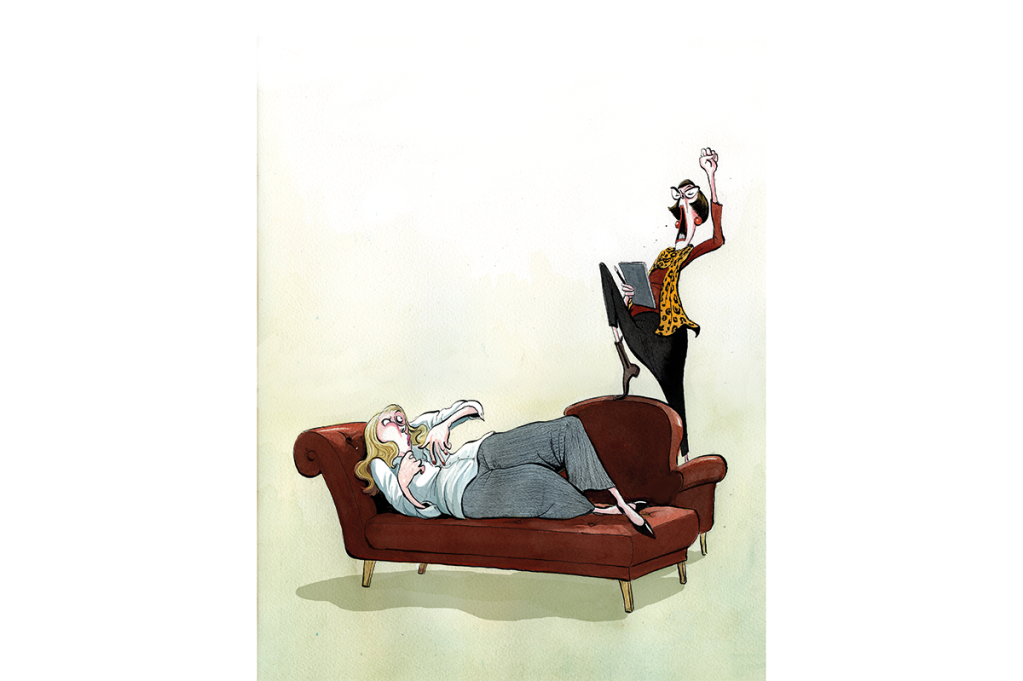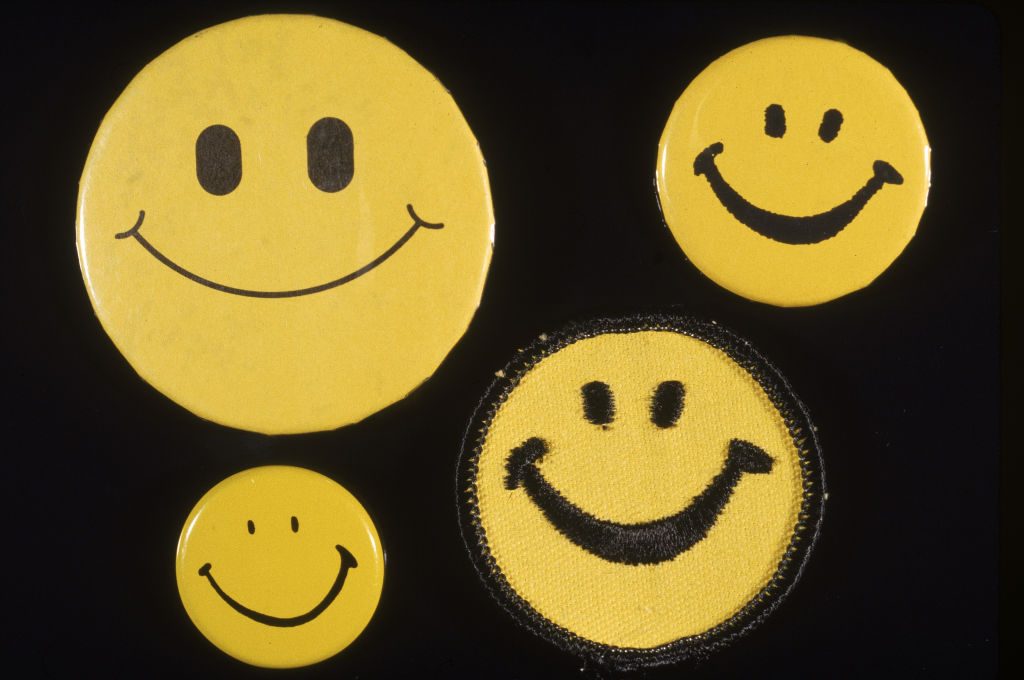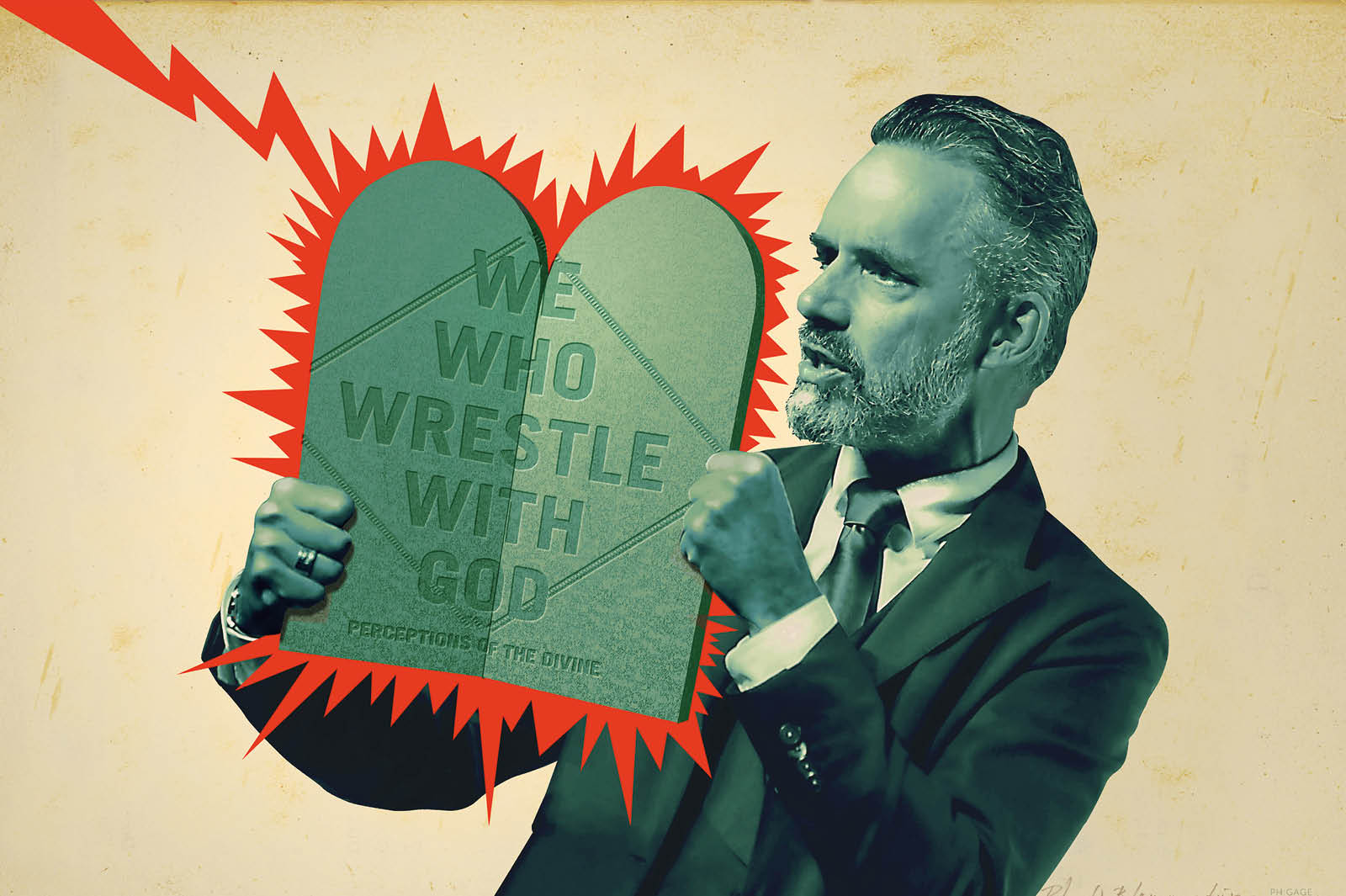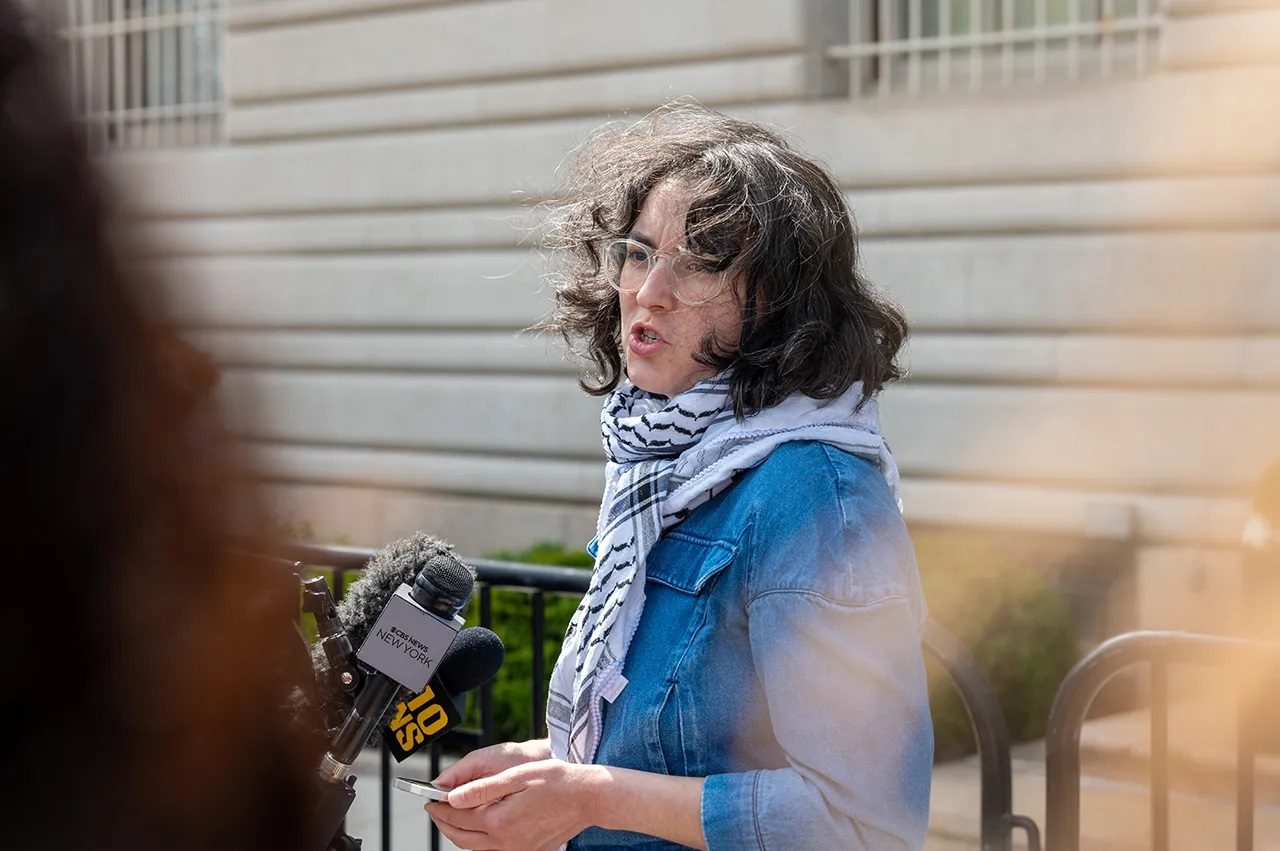In winter 2019, Leslie Elliott enrolled as a graduate student in Antioch University’s Mental Health Counseling program. At first, she found it to be a stimulating master’s program — informative and clinically relevant. Then she took a required course in “multicultural counseling.”
“We were taught that race should be the dominant lens through which clients were to be understood and therapy conducted,” says Elliott, a mother of four who’d majored in psychology.
Elliott’s professors taught her, for example, that if clients were white, she was supposed to help them see how they unwittingly perpetuate white supremacy. “We were encouraged to regard white clients as ‘reservoirs of racism and oppression.’” White women, one professor told a class, were “basic bitches,” “Beckys” and “nothing special.”
If the client were black, Elliott was told to ask how it felt to sit with her, a white counselor. If the client felt at ease, “my job — regardless of what brought him to therapy — was to make him more aware of how being black compounded, or perhaps caused, his problems.”
After the murder of George Floyd in May 2020, the three-year program intensified its emphasis on race and oppression, making clear that counselors were to be foot soldiers in the culture wars. “Incredible as it sounds,” says Elliott, “we were encouraged to see ourselves as activists and remake ourselves as social change agents.”
“Critical social-justice therapists” is what Aaron Kindsvatter and others call this new breed of mental health professional graduating from programs across the country. Last year, Kindsvatter left his tenured position at the University of Vermont to pursue private practice in Burlington, where he has treated a handful of clients who were, in his words, “victims of indoctrination attempts” by their “authoritarian” therapists. To be clear, Elliott and Kindsvatter are not talking about a mismatch in sociopolitical views wherein, say, a client is conservative and the therapist is liberal or progressive. To be sure, such a discrepancy can — though by no means inevitably does — create tension. Studies have shown, in fact, that therapeutic relationships were stronger when clients felt comfortable disclosing their political views to the therapist and when the therapist was accepting of those views.
But even when sociopolitical discrepancies affect therapy, they do so within the confines of a time-honored framework that places primacy on the patient.
Social-justice therapy, SJT, however, overturns that framework. It endows therapists — who understand themselves as activists first, not healers — with the power to define the goals of therapy, overriding the client’s needs and preferences.
“Most damning,” Kindsvatter tells me, “is that the major governing entities in the field have turned a blind eye to blatant ethical breaches, because such breaches align with a preferred ideology.”
The governing council of the American Counseling Association, or ACA, has endorsed “multicultural and social-justice counseling competencies.” According to these competencies: “Multicultural and social-justice competent counselors assist privileged and marginalized clients in unlearning their privilege and oppression, [help] privileged and marginalized clients develop critical consciousness by understanding their situation in context of living in an oppressive society” and “initiate discussions with privileged and marginalized clients regarding how they shape and are shaped by local, state and federal laws and policies.”
Another governing entity is the Council for Accreditation of Counseling and Related Educational Programs. The council requires programs to include training on “the effects of power and privilege for counselors and clients” and “strategies for identifying and eliminating barriers, prejudices and processes of intentional and unintentional oppression and discrimination.”
In 2017 the American Psychological Association published its “Multicultural Guidelines: An Ecological Approach to Context, Identity and Intersectionality.” Guideline number five stipulates that “psychologists aspire [to] address institutional barriers and related inequities, disproportionalities, and disparities of law enforcement, administration of criminal justice, educational, mental health and other systems as they seek to promote justice [and] human rights.” A common thread in all these directives is the total disregard for patients’ agency, which assumes that social forces are the singularly important determinant of their problems.
Social-justice therapy grew out of a practice called multicultural counseling. Grounded in the idea that therapy with minority populations requires a distinct set of competencies, the first textbook on the subject, Counseling the Culturally Different, was published in 1981. By 1992, the ethics code of the APA held that a psychologist could be sanctioned if he or she is not behaving in a manner that could be considered “culturally sensitive.” The APA’s 2002 “Guidelines on Multicultural Education, Training, Research and Organizational Change for Psychologists” set a sensible standard for culturally sensitive practice, saying that “psychologists are urged to gain a better understanding and appreciation of the worldview and perspectives of those racially and ethnically different from themselves.”
Psychologist Nina Silander studies the intersection of politics and psychotherapy. While critical of the brand of counseling taught to Elliott, Silander acknowledges that, as she explained to me, “taking [into] account broad variations in culture, such as individualist versus collectivist values, and variations in level of acculturation within immigrant groups, as well as variations in family-of-origin cultural differences, can be very valuable.”
Some ethnic and racial groups, for example, are more likely to report emotional distress in the form of bodily sensations; sometimes culturally specific metaphors allow therapists to make a point more clearly. Such cultural adaptations have been incorporated with success into well-tested cognitive behavioral therapy strategies.
But social-justice therapy, in particular, takes things further. It calls attention to the fact that it is common for “marginalized counselors to work with privileged clients in today’s world,” a worthwhile observation. But then advocates go on to “set the expectation that counselors address issues of power, privilege and oppression that impact clients.” You could argue that a client who knows what social-justice therapy is about should be free to enter into it. Perhaps. But I worry that the perspective of such therapists is so totalizing that they’d have no clinical flexibility to deploy another therapeutic approach when needed.
Today, multicultural therapy and social-justice therapy have bled into one another. Counseling the Culturally Different is now in its ninth edition (the word “different” now replaced with “diverse”) and the leading textbook in its field. It combines pragmatism — the importance of “clinical humility”; the importance of merging the “universality of the human condition with the role of culture in the manifestation of both the presenting concern and the treatment approach” — with instruction to counselors to see patients first and foremost though an identitarian lens.
Val Thomas, a London psychotherapist and founder of Critical Therapy Antidote, a website devoted to “protecting the integrity of talking therapies,” thinks of multicultural therapy and SJT as part of a “motte and bailey” dynamic through which “critical social justice” is making significant inroads.
As Thomas explains it, a perfectly reasonable, therapeutic goal — the safe motte — is set by the social-justice therapist. That goal is expressed as a tenet of multicultural therapy, namely that “counselors need to have frameworks and tools which help them talk about the difficult issues of racial/ethnic/cultural context with their clients.” But then the therapist reaches further, introducing a new, controversial tenet. This wider “bailey defense” holds, as Thomas describes it, that “the counselor must consider how sociopolitical factors such as race influence the client’s counseling concerns.”
Thus, a completely defensible aim of multicultural counseling — to possess benign frameworks and tools to talk about issues of race, etc. — has morphed into a far more dubious proposition: importing the counselor’s agenda. Thomas presents the strategy in action: “Any attempt to engage in critique… or participate in any kind of constructive criticism [of the ideological agenda] will be framed as an attack that triggers a withdrawal to the motte (the importance of helping counsellors develop ways of talking to their clients about the sociopolitical factors implicated in their issues). As a vehicle for importing social-justice praxis into mainstream therapy, especially therapy education, it has been very successful.”
Social-justice therapy presents a vexing paradox. “It doesn’t acknowledge universals, because groups are supposedly too distinct from one another,” says psychologist Craig L. Frisby, “and it doesn’t acknowledge individuals’ uniqueness, because only group affiliation matters.” Frisby is the editor, with psychologist William O’Donohue, of the 2019 textbook Cultural Competence in Applied Psychology, which explores challenges, strengths and limitations of current cultural competence practice. “Students come to learn that if they want to be a good psychologist, they are going to have to buy into an essentialist, stereotyped view of the person.”
Students must also buy into other dubious practices. They are taught, for example, to impose an identity-driven narrative on the client. Instead of treating each client as a unique individual and working collaboratively, the social-justice therapist reduces them to avatars of gender, race and ethnicity.
While responsible therapists help clients cultivate the power of self-observation and encourage them to experiment with new attitudes, perspectives and actions, social-justice therapists foment grievance. Good therapy helps clear a path to autonomy. Social-justice therapy inculcates victimhood by convincing patients that they have little choice or agency. That a therapist would explore the life-affecting consequences of a patient’s poor choices would be anathema to a social-justice counselor.
It is impossible to imagine how a healthy therapeutic alliance between counselor and patient — a core bond of trust nurtured through caring neutrality and compassionate detachment — could thrive under these conditions. I’ve heard many reports of social-justice therapists scolding or rejecting patients. And reams of long-term data show that attaining a good rapport with a therapist is the most important factor in determining the outcome of therapy.
When I was a resident in psychiatry, learning how to become a skilled therapist was an all-consuming ambition for me and my colleagues. Trust me, it’s harder than it looks.
We met weekly with seasoned experts to discuss our cases. We learned to keep our private passions, character flaws and blind spots from distorting the work. We were in therapy ourselves to understand those enthusiasms, flaws and blind spots. We were vigilant about “countertransference,” Freud’s term for psychiatrists’ own emotional reaction to a patient, which could cloud our clinical judgment. Even experienced therapists pay trusted supervisors to help them manage complexities that arise in the course of their work with patients.
Leslie Elliott is a rare voice willing to go public while still in training. Last fall, she created YouTube videos and posted Substack commentary in order to expose what she calls “the ideological capture” of the counseling profession as a warning to both future graduate students and potential clients.
But resistance from within will be hard. The teaching institutions and regulatory institutions, such as the APA, and the mental health profession in general, are being swept up in groupthink; those who balk are often too intimidated to speak up.
Meanwhile, clients are eager to avoid this alarming trend. There are list-serves catering to those seeking “non-woke” therapists. A psychologist colleague in New York City is about to launch an institute that will foster open inquiry in mental-health care and support individuals who have had adverse experiences at the hands of social-justice practitioners.
The most ambitious effort belongs to Brian S. Canfield, a professor of clinical mental health counseling at Florida Atlantic University and former president of the American Counseling Association. In July 2021, he launched the International Association of Psychology and Counseling. Its 500 members share the association’s position that, as Canfield puts it, “advocacy should be the domain of individual conscience, not one’s identity as a counselor.”
Highly questionable practices can harden into professional orthodoxy and conflict with what is best for patients. This is especially troubling as people are seeking help for mental-health care in record numbers.
Of course, skilled therapists must respect cultural values and traditions and educate themselves as best as possible in local anthropology. But preparation and sensitivity of this sort is far different from bringing a largely preordained, victim-oriented cultural script to a session and imposing it on a client.
Social-justice therapy risks additional harms by overlooking the fact that race and ethnicity may not be the most important of the many dimensions, such as personality variables, geographic region, political orientation, family experiences, educational attainment, which affect patients’ life experiences. Then there is the crowning hypocrisy of stereotyping certain groups as “oppressors” at the same time social-justice therapists consider prejudice directed at groups to be the cause of so much distress in the world.
In October, the dean of Antioch’s counseling graduate program reacted to Elliott’s online postings. In an email, he urged students and faculty not to watch her videos and to reach out to an ad hoc “crisis team” to help them handle their reactions to the “hate speech” she allegedly disseminated.
Elliott, who is unsure whether the school will ask her to leave, told its officials that she wants the option of finishing her remaining coursework and receiving her degree, as well as an apology for “false accusations.” She also informed them that she will continue to speak out.
This article was originally published in The Spectator’s March 2023 World edition.

























